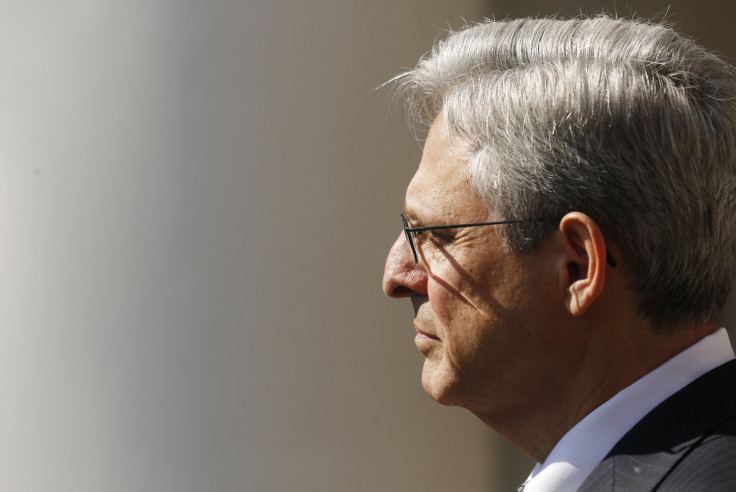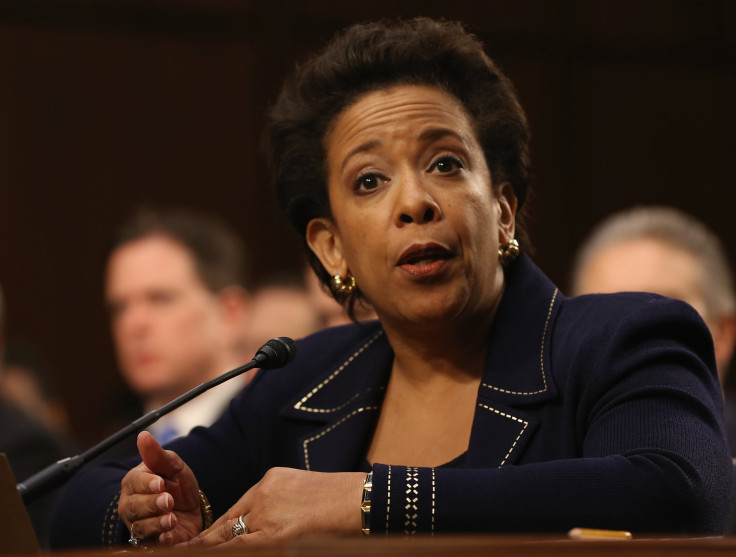Supreme Court Nominee 2016: Obama Missed A Diversity Opportunity, Black And Asian Leaders Say

U.S. President Barack Obama’s tenure as the first African-American commander-in-chief is coming to a close. But in announcing Judge Merrick Garland of the U.S. Court of Appeals in the District of Columbia as his nominee Wednesday for the U.S. Supreme Court, the two-term president let down racial minority groups who hoped he would end his service making more historic moves.
For years, members of the black, Latino and Asian communities have seen opportunity in Obama’s presidency to make the nation’s government more representative of a U.S. population that is more than 40 percent nonwhite. They had urged the president to make history and choose an African-American female or an Asian-American as the next court justice, while also pledging to put pressure on the Republican senators who've vowed to block any nominee put forward until the next president is sworn in. While activists said Wednesday they recognized that Garland may have been the president’s absolute best choice among a handful of vetted candidates, they also expressed some disappointment that racial progress on the nation’s highest court will be deferred.
U.S. Rep. Judy Chu, chairwoman of the Congressional Asian Pacific American Caucus, said there is little doubt among caucus members that Garland, who has more judicial experience than any other federal judge on the bench, earned the nomination. But with court cases on immigration law and other “critical issues that would affect millions of Asian-American and Pacific Islander families,” the choice of an Asian-American jurist would have been important to the president’s legacy, said Chu, of Los Angeles.
“We have been working very hard for years to put forward names of Asian-American judges whom the president could pick,” she said in a phone interview Wednesday. “We did feel like this was a historic opportunity.”
Chu noted that Obama has increased the number of Asian-American judges on the lower federal courts from eight to 25, which hasn’t gone unnoticed by the community.
“We’re prepared to support his decision,” she said. “Believe me, we will not stop in our efforts to make [an Asian Supreme Court justice] happen.”
If confirmed by the U.S. Senate, the 63-year-old Garland, who is white, would replace the late Justice Antonin Scalia, who was also white. The current court is made up of six white people, a Latina and a black man.
The president's decision sparked some anger in the African-American community, said Barbara Arnwine, president of the Transformative Justice Coalition, a Washington, D.C.-based economic and social justice group. Arnwine said black leaders saw the Supreme Court vacancy as an opportunity to make “a real adjustment” and signal to his African-American base that he hasn’t forgotten about them in his decision.
“This is his final action on the court, most likely,” she said. “For him to not use this as a decisive moment, where he could have made a significant difference in the future of the court and the diversity of the court, it's a disappointment and it hurts.”
Despite the setback, Arnwine said black leaders were likely to support the president's right to have his choice considered by the Senate. Leaders from LGBT rights groups and Latino advocacy organizations, including the Human Rights Campaign and the League of United Latin American Citizens (LULAC), also expressed their support for Garland on Tuesday.
“We urge the Senate to act swiftly in considering and confirming Judge Garland,” Roger C. Rocha Jr., LULAC’s national president, said in a statement.

Garland was among at least six candidates under consideration, including three women and two people of color. Those candidates included Sri Srinivasan, an Indian-American judge on the U.S. Court of Appeals for the District of Columbia circuit, and Ketanji Brown Jackson, an African-American woman also serving as a U.S. district judge in Washington, according to the Washington Post.
The choice of Srinivasan as nominee would likely have sparked celebration in the Indian-American community. If confirmed, Srinivasan would have been the first Asian to serve on the nation's highest court. Asians-Americans, an estimated 15 million people in the U.S, are the nation's fastest-growing demographic. The most recent survey of Asian-Americans found that Indian-Americans gave the president his highest approval rating, at 68 percent compared to a nationwide approval rate of around 40 percent.
The Sikh American Legal Defense and Education Fund (SALDEF), a Washington, D.C.-based civil rights organization, acknowledged its hope that Obama would have chosen Srinivasan. “While SALDEF called on President Obama to nominate the first Asian American Supreme Court Justice, we realize the profound statement Sri Srinivasan made as the first Asian American in history to make it to a president’s ‘short list,’” the organization said in a statement Wednesday. “We eagerly await the first Asian-American Supreme Court justice.”
There have only been two black Supreme Court justices – the late Justice Thurgood Marshall, confirmed in 1967, and Clarence Thomas, confirmed in 1991 – but no black women. Loretta Lynch, the first African-American woman to serve as U.S. attorney general, whose delayed confirmation by the Senate sparked a race controversy, announced March 8 that she asked the White House to take her name out of the running. Lynch felt “the limitations inherent in the nomination process would curtail her effectiveness in her current role,” Justice Department spokeswoman Melanie Newman said.

Lynch commended the president’s nomination of Garland, in a statement released Wednesday after the announcement. “His impeccable credentials, steadfast fidelity to the law and firm devotion to the public interest make him an outstanding choice to sit on our nation's highest court, where I am certain he will serve with integrity and wisdom,” she said.
In February, Nevada Gov. Brian Sandoval, a Republican who is of Mexican ancestry, also withdrew his name from consideration after he learned that his name was being floated as a possible choice, the Hill reported.
Of 111 Supreme Court justices in the nation’s history, 106 have been white men, according to the Brennan Center for Justice at the New York University School of Law. Justice Sonia Sotomayor, a Hispanic woman, is the third person of color and the third woman appointed to serve on the Supreme Court in its 221 year history.
Federal trial courts are responsible for hearing over 300,000 cases per year, more cases than the Supreme Court, and are composed of just nearly 32 percent female judges and more than 13 percent black judges, according to a recent study. The diversity of the nation’s top law school students has for years shown minorities are underrepresented, with some being as much as 90 percent white.
“The current judiciary is still is heavily white and male, but there are a lot of talented students making their way into the profession,” said Mark Alexander, associate dean and professor of law at Seton Hall University Law School in Newark, New Jersey. “My students are really across the spectrum in terms of their perspective on the world, race, gender and sexual orientation. I’m quite pleased in what the future looks like.”
Alexander, who is black and once clerked for a federal judge in San Francisco, said Obama should be applauded for his record of appointing women, people of color, and gays and lesbians to the federal bench. “The reality is we can never rest,” he added. “We should always be trying to ensure that the legal profession represents the great diversity of this nation.”
Diversity on the bench does affect the way judges hear cases. In her 2015 study, “Representation on the Courts? The Effects of Trial Judges’ Sex and Race,” University of Georgia political science assistant professor Christina Boyd noted that the implications of diversity in the nation’s court systems are vast. In an examination of public data on employment discrimination cases brought by the Equal Employment Opportunity Commission, Boyd found that black judges decided in favor of the race discrimination plaintiffs about 65 percent of the time, while white judges did so only 22 percent of the time. These findings support other recent studies that show a strong effect of jurist diversity in many settings, whether it’s writing opinions, posing questions in oral argument, the hiring of court clerks and office staff, or making decisions on arraignments and bail.
Despite the suggested value of diversity on the bench, that conversation is being drowned out by Republican opposition to any nominee. U.S. Sen. Mike Lee, a Republican member of the Senate Judiciary Committee, restated his commitment to block Obama’s pick until after the 2016 presidential election.
I am committed to let the American people have a voice in deciding who will be Justice Scalia's replacement: https://t.co/ufRtDgs8Gk
— Mike Lee (@SenMikeLee) March 16, 2016
“In light of the contentious presidential election already well underway, my colleagues and I on the Judiciary Committee have already given our advice and consent on this issue: We will not have any hearings or votes on President Obama’s pick,” Lee said in a statement released before the announcement. “Any meeting with any nominee put forward by President Obama would only be a waste of the Senate’s time. The Court has very ably dealt with temporary absences in the past and will do so again now.”
Alexander, the Seton Hall professor, said Republicans run the risk of making a further mockery of Congress as an institution. “They do not have to approve [Garland], but saying they won’t give him a vote would make them derelict in their duties. They should be ashamed of themselves, quite honestly," he said.
© Copyright IBTimes 2024. All rights reserved.






















